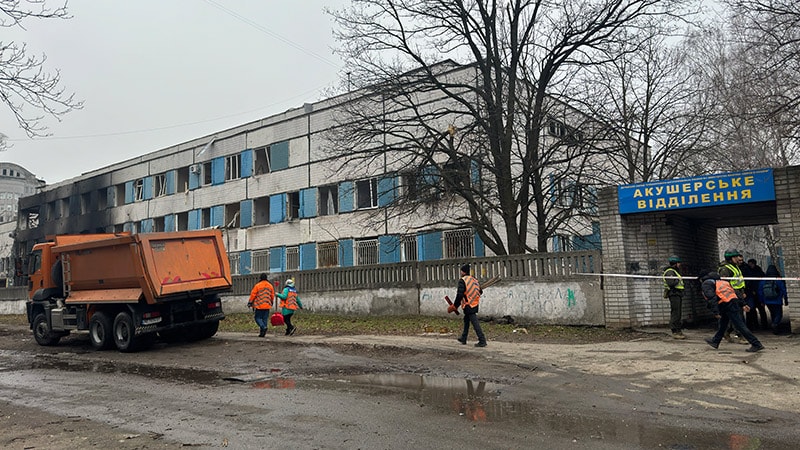Harvard Medical School Aids Ukrainian Hospitals Amid War
Core Concepts
Western institutions like Harvard Medical School are providing critical support to Ukrainian healthcare workers to improve infection control and healthcare delivery during the ongoing war.
Abstract
The content highlights the dire situation in Ukrainian hospitals regarding hospital-acquired infections and antimicrobial-resistant organisms post-Russia's invasion. Western institutions, particularly Harvard Medical School, are aiding Ukrainian healthcare workers in improving infection control and healthcare delivery during the war. Key points include:
Ukrainian hospitals faced higher infection rates post-assault.
Lack of infection control measures in Ukrainian hospitals pre-war.
Harvard Medical School mentors Ukrainian clinicians.
Specialists from various fields receive training to enhance healthcare delivery.
Focus on improving infection control, treatment, and mental health.
Importance of disseminating knowledge and improving education in Ukrainian healthcare.
Western aid includes supplies and education.
Emphasis on better infection control practices suited for wartime conditions.
Concerns about fatigue and ongoing support for Ukraine.
Fundraising efforts to support Ukrainian healthcare.
Pianist Pavlo Gintov raises funds through concerts.
Potential consequences if Russia is unchecked.
Harvard Docs Train Ukrainian Counterparts 2 Years Into War
Stats
"a recent report found rates of hospital-acquired infections and antimicrobial-resistant organisms in Ukrainian hospitals were 'substantially higher' after the assault than they were 5 years before the war."
"Since the war began, childbirth rates have plummeted, while rates of posttraumatic stress disorder have skyrocketed, especially among teenagers."
"Physicians already are seeing improvement in Ukrainian hospitals."
"His hospital sees 'the most severely wounded warriors' who enter the hospital already with resistant infections."
"The group has raised about $750,000."
Quotes
"We have a huge problem." - Denys Surkov, MD
"Lots of small boats make a huge difference." - Mark C. Poznansky, MD, PHD
"If they learn how to take care of these complex patients, care for all patients gets better." - Serguei Melnitchouk, MD, MPH
Key Insights Distilled From
by John Dillon at www.medscape.com 02-06-2024
https://www.medscape.com/viewarticle/harvard-docs-train-ukrainian-counterparts-2-years-war-2024a10002kv
Deeper Inquiries
How can the international community further support Ukrainian healthcare beyond training programs?
The international community can further support Ukrainian healthcare beyond training programs by providing ongoing financial aid to improve infrastructure, supply essential medical equipment and medications, and support research initiatives to address specific healthcare challenges in the country. Collaborating with local healthcare professionals to develop sustainable solutions tailored to the Ukrainian context is crucial. Additionally, facilitating partnerships between Ukrainian healthcare institutions and international organizations can help leverage resources and expertise to enhance the overall healthcare system in Ukraine.
What potential challenges or criticisms might arise regarding Western institutions' involvement in Ukrainian healthcare?
Some potential challenges or criticisms regarding Western institutions' involvement in Ukrainian healthcare may include accusations of neocolonialism or cultural imperialism, where Western practices are imposed without considering the local context. There could also be concerns about the sustainability of the initiatives and the long-term impact of external interventions on the autonomy and development of the Ukrainian healthcare system. Furthermore, issues related to resource allocation, transparency, and accountability in aid distribution may arise, leading to questions about the effectiveness and efficiency of Western involvement in Ukrainian healthcare.
How does the cultural and historical context of Ukraine impact the effectiveness of medical aid efforts?
The cultural and historical context of Ukraine significantly impacts the effectiveness of medical aid efforts. The legacy of the Soviet Union's healthcare system, with its centralized and often outdated practices, has left a mark on the current Ukrainian healthcare infrastructure. Cultural norms, beliefs, and attitudes towards healthcare, as well as historical experiences of conflict and trauma, shape the way healthcare is perceived and accessed in Ukraine. Understanding these factors is essential for designing interventions that are culturally sensitive, sustainable, and responsive to the unique needs of the Ukrainian population. Additionally, historical tensions and geopolitical dynamics in the region can influence the delivery and acceptance of medical aid, requiring a nuanced approach to navigate these complexities and ensure the success of healthcare initiatives in Ukraine.
0
More on Healthcare
